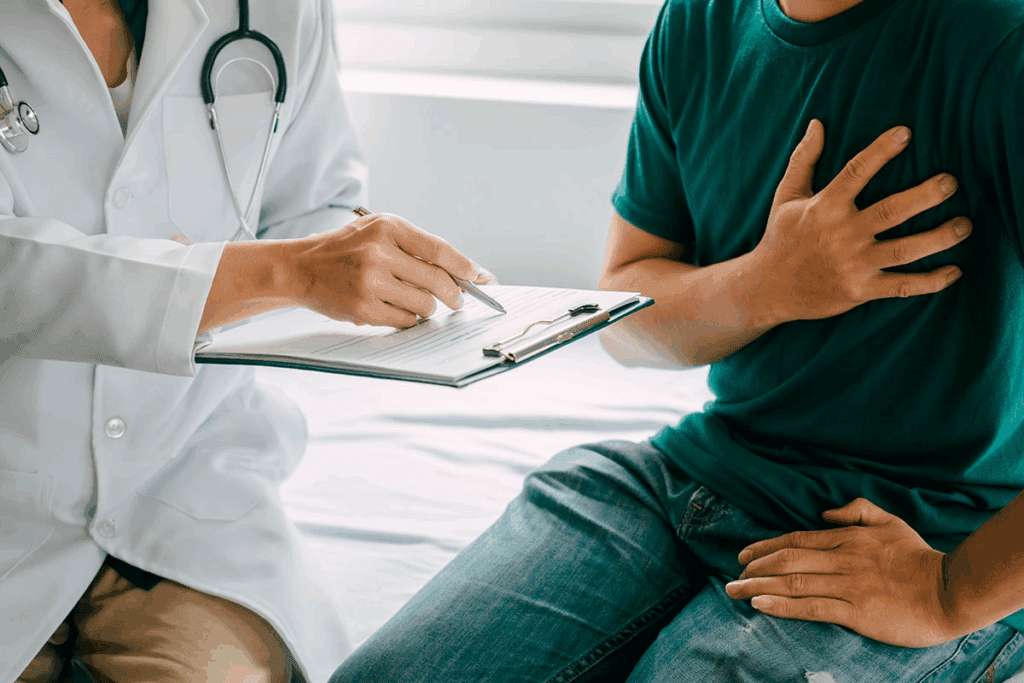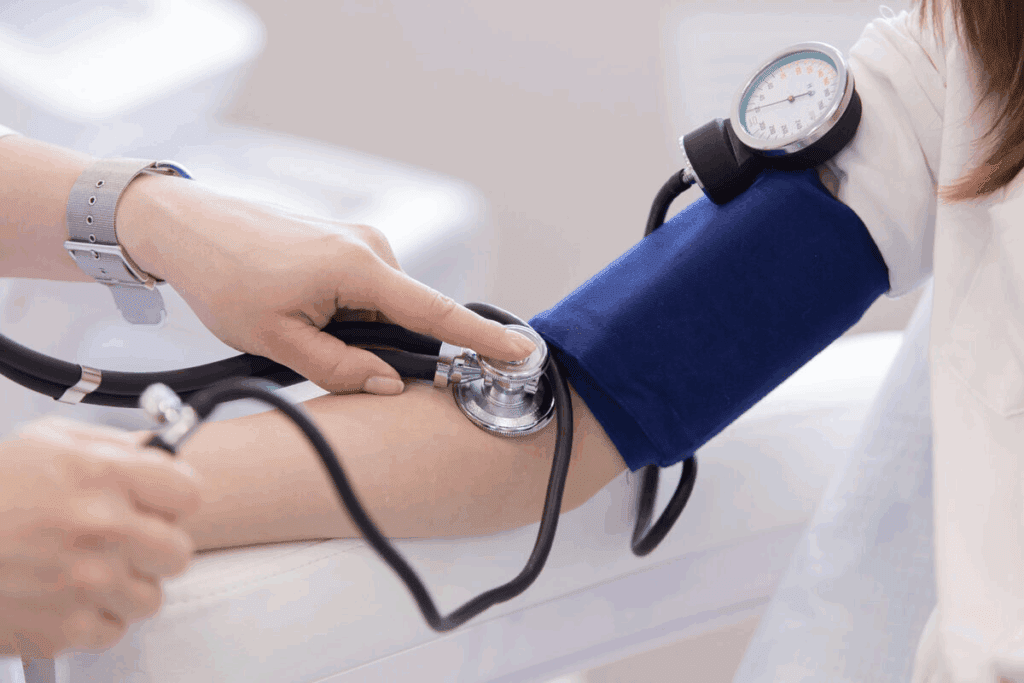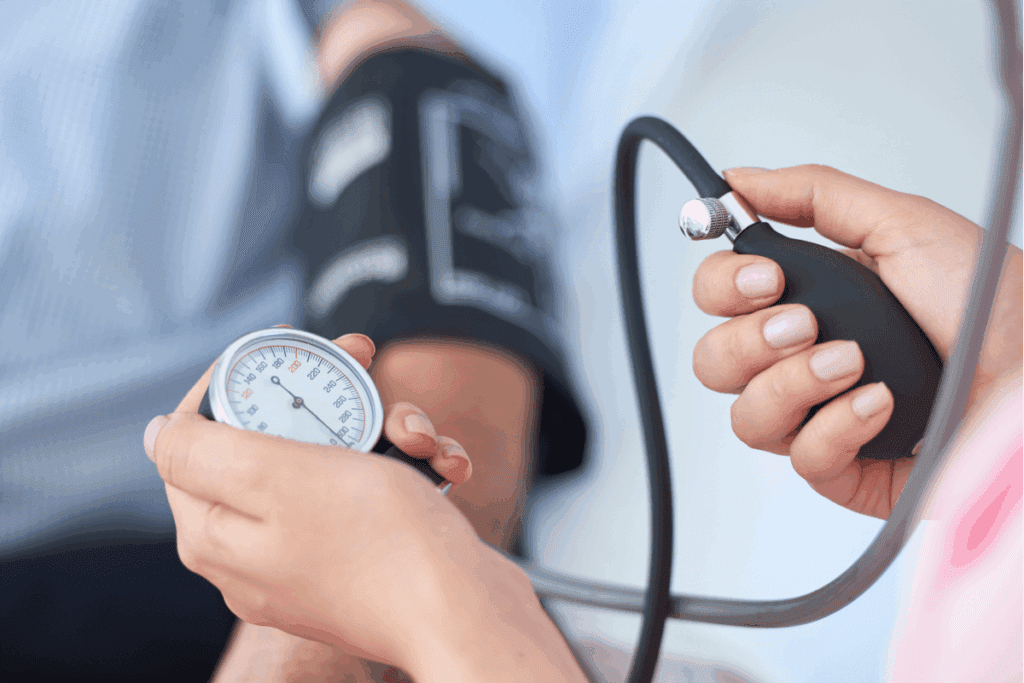
Hypertension, often called the “silent killer,” can lead to severe health complications if left untreated. At Liv Hospital, we empower our patients with knowledge about the warning signs of this condition.
Discover high blood pressure symptoms and when to seek medical attention.
Most people with hypertension experience no obvious symptoms, making it key to understand the warning signs. We are committed to helping you stay proactive and protected. By knowing the 5 key symptoms of hypertension, you can take action early.
Key Takeaways
- Understanding the risks associated with hypertension
- Recognizing the importance of early detection
- Identifying the 5 key warning signs of hypertension
- Empowering patients with knowledge to stay proactive
- Comprehensive care for international patients at Liv Hospital
Understanding High Blood Pressure: The Silent Killer

High blood pressure is often called the “silent killer.” It can cause serious health problems without clear signs. Millions of people worldwide suffer from hypertension, or high blood pressure.
What Is Hypertension and How Common Is It?
Hypertension means your blood pressure is too high. It’s a big risk for heart disease, stroke, and kidney problems. Studies show it affects a lot of adults worldwide, often without being caught early.
Hypertension is a big problem everywhere. It affects many people in different places. We need to spread the word and take action to protect our health.
Why High Blood Pressure Often Goes Undetected
High blood pressure often doesn’t show symptoms early on. This makes it hard to find without regular checks. For years, it can quietly harm our organs.
Not having symptoms early is why regular health checks are so important. We must stay alert and take care of ourselves to catch and manage hypertension.
Risk Factors for Developing Hypertension
Many things can increase your chance of getting high blood pressure. These include family history, age, being overweight, not being active, smoking, and drinking too much alcohol. Knowing these risks helps us prevent and manage hypertension better.
- A family history of hypertension increases an individual’s risk.
- Age is a significant factor, with the risk increasing as one gets older.
- Obesity and physical inactivity are lifestyle factors that contribute to hypertension.
- Smoking and excessive alcohol consumption are also major risk factors.
By knowing these risks, we can take steps to lower our chance of getting hypertension. This helps avoid its serious complications.
Recognizing High Blood Pressure Symptoms: Why Early Detection Matters

High blood pressure is often called a “silent killer.” It can cause a lot of damage before you even notice symptoms. Many people live with high blood pressure for years without knowing the risks to their health.
The Asymptomatic Nature of Early Hypertension
In the early stages, hypertension doesn’t show obvious symptoms. This makes it hard for people to find out they have it without regular checks. It’s only when they have a serious event, like a heart attack, that they might find out.
Regular monitoring is key to catch it early. Adults should check their blood pressure often. This is even more important if you have risk factors like family history, obesity, or a sedentary lifestyle.
When Symptoms First Appear: Warning Stages
As hypertension gets worse, some people start to notice symptoms. These can be vague and different for everyone. Common signs include headaches, dizziness, and shortness of breath. It’s important to see a doctor if these symptoms don’t go away or get worse.
The Dangers of Untreated Hypertension
Not treating high blood pressure can lead to serious problems. These include heart disease, kidney damage, and stroke. The table below shows some of the risks of not managing high blood pressure.
| Complication | Description | Risk Factors |
| Heart Disease | Increased risk of heart failure and coronary artery disease | Family history, smoking, high cholesterol |
| Kidney Damage | Potential for kidney failure due to prolonged high blood pressure | Diabetes, obesity, family history of kidney disease |
| Stroke | Risk of ischemic or hemorrhagic stroke due to high blood pressure | Age, smoking, atrial fibrillation, high cholesterol |
Knowing these risks shows why it’s so important to catch and manage hypertension early. This can help prevent serious health problems.
Headaches: The Most Common High Blood Pressure Warning Sign
High blood pressure often shows itself through various symptoms, with headaches being a common sign. We’ll look into how headaches relate to hypertension. This includes the types of headaches linked to high blood pressure.
Types of Headaches Associated with Hypertension
Hypertension can lead to different headaches, mainly because of the increased pressure on brain blood vessels. The most common types are:
- Tension Headaches: These feel like a band or squeezing around the forehead. They can get worse with high blood pressure.
- Migraine Headaches: While not directly caused by hypertension, migraines can be a worry for those with high blood pressure. This is because they can lead to more stress on blood vessels.
How to Distinguish Hypertension Headaches from Other Types
Telling apart headaches from hypertension and other types can be hard. Yet, some signs can point to a link with high blood pressure:
- Headaches that start in the morning, possibly because blood pressure goes up while sleeping.
- Headaches that keep coming back without a clear reason.
- Headaches with other symptoms like dizziness or blurry vision.
When Headaches Require Immediate Medical Attention
While most headaches aren’t a big deal, some need quick medical help:
- Severe or Sudden Headaches: These are often called “the worst headache of my life.” They might mean a hypertensive emergency.
- Headaches with confusion, weakness, or trouble speaking.
- Headaches that get worse or have other worrying symptoms.
It’s key to know how headaches and high blood pressure are connected for early detection and treatment. If you have ongoing or severe headaches, seeing a doctor is a must.
Dizziness and Lightheadedness: When Your Balance Is Affected
High blood pressure can affect your balance, leading to dizziness. We’ll look at how hypertension impacts balance and how to manage symptoms.
The Connection Between Blood Pressure and Balance
Dizziness often comes from less blood flow to the brain. High blood pressure can make blood vessels less flexible. This can reduce blood flow and cause dizziness or lightheadedness. This symptom is concerning because it raises the risk of falls.
The inner ear’s vestibular system is key for balance. High blood pressure can harm the inner ear’s blood vessels. This can disrupt balance and cause dizziness. Knowing this helps manage balance issues linked to hypertension.
Differentiating Hypertension-Related Dizziness from Other Causes
Dizziness can stem from many sources, like inner ear problems or medication side effects. To see if dizziness is from high blood pressure, look at other symptoms and medical history. If dizziness comes with headaches or vision changes, it might be related to high blood pressure.
Figuring out if dizziness is from hypertension or something else needs a full check-up. This includes blood pressure checks, medical history, and sometimes tests to rule out other causes.
Risk Factors for Falls Due to Hypertensive Dizziness
People with hypertension are more likely to fall due to dizziness. Age, other health issues, and certain medications can increase this risk. Older adults are at a higher risk of serious injuries from falls.
To lower fall risk, managing hypertension is key. This means regular blood pressure checks, following treatment plans, and making lifestyle changes. Improving home safety can also help prevent falls.
Understanding the link between high blood pressure and dizziness helps manage symptoms and fall risk. Regular health check-ups and a healthy lifestyle are important for managing hypertension.
Blurred Vision and Visual Disturbances: Seeing the Signs
High blood pressure can harm our vision, leading to serious issues. It affects the blood vessels in our eyes, causing visual problems. Knowing these signs is key to catching hypertension early.
How High Blood Pressure Affects Your Eyes
Hypertension can damage the blood vessels in the retina, known as hypertensive retinopathy. This can cause blurred vision, double vision, or even vision loss. The retina sends visual information to the brain, and damage can greatly affect our sight.
Hypertensive retinopathy has different stages, from mild to severe. Early stages might not show symptoms, but as it worsens, vision problems can become severe. Regular eye exams can catch this condition early, helping to manage it.
Types of Visual Changes That May Indicate Hypertension
Several visual issues can signal high blood pressure. These include:
- Blurred vision
- Double vision
- Vision loss
- Flashes of light
- Floaters
These symptoms happen because high blood pressure damages the blood vessels in the eyes. If you notice any, see a doctor right away.
Long-term Vision Risks of Untreated Hypertension
Ignoring high blood pressure can cause permanent vision loss. The constant strain on blood vessels can lead to serious damage. This can result in:
| Condition | Description | Potential Outcome |
| Hypertensive Retinopathy | Damage to the retina’s blood vessels | Vision impairment or blindness |
| Choroidopathy | Fluid buildup under the retina | Vision distortion or loss |
| Optic Neuropathy | Damage to the optic nerve | Vision loss |
Controlling high blood pressure through lifestyle changes and medication can prevent these vision problems. It’s important to regularly check blood pressure and eye health to avoid long-term vision issues.
Shortness of Breath: When Hypertension Affects Your Lungs
High blood pressure can make it hard to breathe. It makes the heart work too hard, leading to heart failure and breathing problems. It’s important to understand this link to manage high blood pressure well.
The Heart-Lung Connection in Hypertension
The heart and lungs work together closely. With hypertension, the heart pumps blood harder. This strain can cause heart failure, where the heart can’t pump enough blood. Fluid then builds up in the lungs, causing cardiac dyspnea or shortness of breath.
Distinguishing Cardiac Dyspnea from Other Breathing Issues
Not all shortness of breath comes from heart problems. Conditions like asthma, COPD, or pneumonia can also cause breathing issues. Look for symptoms like swelling, fatigue, and coughing up pink mucus to tell if it’s cardiac dyspnea. A doctor can do tests to find out the cause.
When Breathing Difficulties Signal a Hypertensive Emergency
In severe cases, hypertensive emergency can cause sudden, severe shortness of breath. This is a medical emergency that needs immediate help. If you have sudden, severe trouble breathing, chest pain, or confusion, go to the emergency room right away. Quick treatment can prevent serious problems like heart attack or stroke.
| Symptom | Cardiac Dyspnea | Other Causes of Shortness of Breath |
| Swelling | Common in legs due to fluid buildup | May not be present or is unrelated to heart function |
| Cough | Often produces pink, frothy mucus | Can be dry or produce colored mucus depending on the cause |
| Onset | Typically gradual, worsening over time | Can be sudden, as in asthma or COPD exacerbation |
Heart Palpitations: Understanding Irregular Heartbeats
Feeling heart palpitations can worry those with high blood pressure. It might mean there’s a problem with the heart’s rhythm. We’ll look at the types of palpitations linked to high blood pressure, their link to arrhythmias, and when to get medical help right away.
Types of Palpitations Associated with High Blood Pressure
High blood pressure can cause different types of heart palpitations. These include:
- Rapid or forceful heartbeats
- Skipped beats or irregular rhythms
- Pounding or fluttering sensations in the chest
The Relationship Between Hypertension and Arrhythmias
Hypertension raises the risk of arrhythmias, like atrial fibrillation. This is a fast and irregular heart rhythm. The high pressure can change the heart’s structure, leading to arrhythmias.
Studies show high blood pressure increases atrial fibrillation risk. This disorder can cause stroke if not treated. It’s key to manage high blood pressure to lower these risks.
| Condition | Risk Factor | Potential Complication |
| Hypertension | Increased risk of arrhythmias | Atrial fibrillation, stroke |
| Atrial Fibrillation | High blood pressure, heart disease | Stroke, heart failure |
When Palpitations Require Immediate Medical Care
Not all palpitations are a worry, but some need quick medical help. These include:
- Palpitations with chest pain or shortness of breath
- Severe dizziness or fainting
- Palpitations that are persistent or severe
If you have these symptoms, get medical help fast. This is to check for serious problems.
It’s important to know how high blood pressure and heart palpitations are connected. By recognizing signs and getting the right care, you can lower your risk of heart problems.
Additional High Blood Pressure Symptoms and Hypertensive Crisis
It’s important to know the less common signs of high blood pressure. High blood pressure often doesn’t show symptoms. But, there are warning signs we should watch for to avoid serious problems.
Nosebleeds and Facial Flushing
Frequent or heavy nosebleeds might mean your blood pressure is too high. High blood pressure can make the small blood vessels in your nose break more easily. Nosebleeds show that your body is fighting to handle the pressure. Also, facial flushing, or a sudden face redness, can be a sign of high blood pressure. This happens because of increased blood flow and wider blood vessels.
Fatigue, Sleep Disturbances, and Cognitive Changes
Hypertension can make you feel very tired or weak. This is because your heart has to work harder to pump blood. This can lower your physical strength. High blood pressure can also cause sleep disturbances, like insomnia or sleep apnea, making fatigue worse. It can also lead to problems with concentration or memory, showing how high blood pressure affects the brain.
Chest Pain and Severe Symptoms Requiring Emergency Care
In severe cases, high blood pressure can cause chest pain, or angina. This is a sign of reduced blood flow to the heart. It’s a medical emergency that needs immediate help. Other severe symptoms include severe headache, confusion, and shortness of breath. These can signal a hypertensive crisis, where blood pressure is extremely high and can damage organs. It’s critical to get emergency care if you experience these symptoms.
Knowing these extra symptoms and when they mean a hypertensive emergency can save lives. We must watch our health closely and get medical help when these signs show up.
Conclusion: Monitoring and Managing Your Blood Pressure
Managing high blood pressure is key to keeping your heart healthy for a long time. Regular blood pressure checks during Primary Care visits are very important. They help find high blood pressure early, before you even notice symptoms.
Knowing the signs of high blood pressure and the need to monitor it is the first step. People can then make lifestyle changes and follow treatment plans if needed. This helps manage high blood pressure effectively.
It’s vital to work closely with your healthcare provider to keep an eye on your blood pressure. Regular check-ups and healthy habits can greatly lower the risks of hypertension. This way, you can look forward to a healthier future.
FAQ
What are the 5 symptoms of high blood pressure?
High blood pressure often has no clear signs. But, some people might feel headaches, dizziness, or shortness of breath. Heart palpitations and nosebleeds are also possible symptoms.
What are the clinical signs of hypertension?
Signs of high blood pressure can include facial flushing and feeling very tired. Sleep problems and changes in thinking are also common. In serious cases, it can cause chest pain and other severe symptoms.
Can high blood pressure cause headaches?
Yes, high blood pressure can lead to headaches. This is more likely if the blood pressure is very high or not controlled well. Severe or frequent headaches might be a sign of hypertension.
How does hypertension affect balance and cause dizziness?
High blood pressure can make you feel dizzy or off-balance. This happens because it affects blood flow and the inner ear. Older people or those with other health issues might be more likely to fall because of this.
What is the connection between high blood pressure and shortness of breath?
High blood pressure can make it hard to breathe. It puts extra strain on the heart and lungs. If you’re having trouble breathing, you should see a doctor right away to check for a serious problem.
Can hypertension cause heart palpitations?
Yes, high blood pressure can cause heart palpitations. This is more likely if the blood pressure is very high or not controlled well. Some types of palpitations need immediate medical help.
What are the warning signs of a hypertensive crisis?
A hypertensive crisis can cause severe symptoms like chest pain and headaches. Shortness of breath and other serious signs are also warning signs. If you have any of these, get emergency help right away.
How can I manage my blood pressure and prevent complications?
Keeping your blood pressure in check is key to avoiding problems. This means watching it regularly and making lifestyle changes. Diet, exercise, and sometimes medication are important.
What are the risk factors for developing hypertension?
Several factors can increase your risk of high blood pressure. These include family history, age, being overweight, and lifestyle choices like diet and exercise.
What are the common symptoms of hypertension?
Common symptoms of high blood pressure include headaches, dizziness, and shortness of breath. Heart palpitations and nosebleeds are also possible. But, many people with hypertension don’t show any obvious symptoms.
References
National Center for Biotechnology Information. (2025). High Blood Pressure Symptoms 5 Key Warning Signs. Retrieved from https://pmc.ncbi.nlm.nih.gov/articles/PMC11344628/[1

